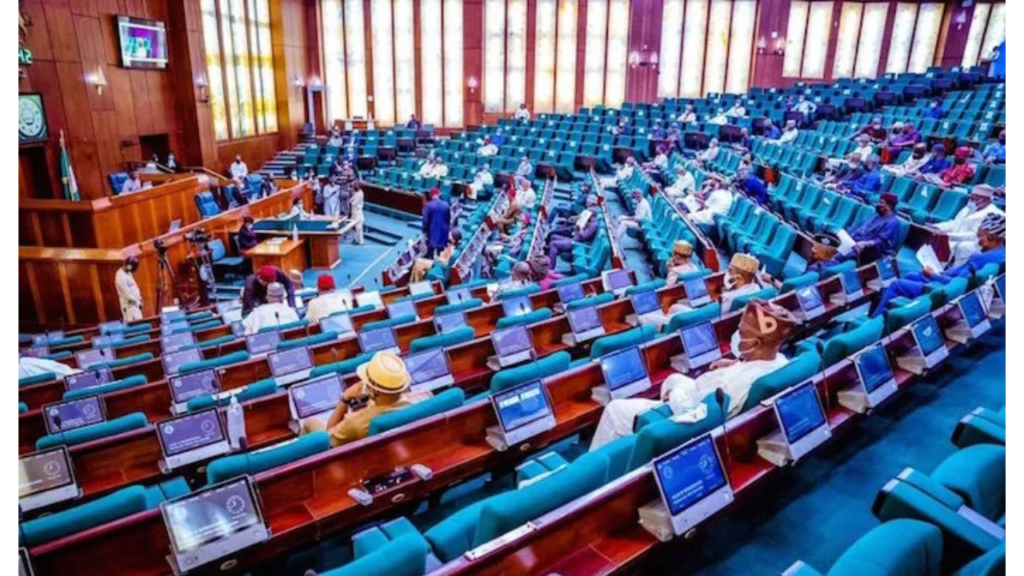
The House of Representatives has urged the Central Bank of Nigeria (CBN) to halt the implementation of the directive to Commercial Banks regarding the inclusion of Social Media usernames in the “Know Your Customer” requirement.
This request followed the adoption of a motion put forward by the Minority Leader, Rt. Hon. Kingsley Chinda, Hon. Kelechi Nwogu, and eight others during the plenary session on Tuesday.
Presenting the motion on behalf of his colleagues, Nwogu stated that the recent directive by the CBN to Commercial Banks to add social media handles as part of the “Know Your Customer” requirements has been made obligatory for the Banks to adhere to.
The lawmaker mentioned that the House is: “Aware that the Central Bank of Nigeria recently released its Customer Due Diligence Regulations, 2023, recognizing the importance of social media handles in promoting compliance with anti-money laundering and counter-terrorism financing provisions.
“Notes that obtaining the additional information would be beneficial for financial institutions to evaluate customers’ online presence and activities, thus facilitating a better assessment of potential risks related to money laundering, terrorism financing, and proliferation financing.”
However, he expressed concern that as commendable as the directive may seem, it could be unnecessary and exert added pressure on the struggling Nigerian population during the ongoing challenging period.
Nwogu argued that the CBN’s directive contradicts the provision of Section 37 of the Constitution of the Federal Republic of Nigeria, 1999 (as amended), which guarantees the right to privacy for citizens.
He pointed out that: “Banks in the country already possess the names, telephone numbers, passport photographs, emails, National Identification Number (NIN), Biometric Verification Number (BVN), utility bills, and other essential requirements for identifying, knowing, and monitoring customers.
“There are more effective methods for monitoring money laundering, terrorism financing, and proliferation financing, such as the Nigeria Police Force (NPF), Nigeria Financial Intelligence Unit (NFIU), the Economic and Financial Crimes Commission (EFCC), intelligence and crime tracking agencies, among others.
“If the directive is enacted, Nigerians who are not on social media but have significant turnovers from their businesses and trades would be compelled or systematically excluded from formal banking systems, resulting in negative effects and consequences.”
He also expressed concern about the hardships that this directive would impose on millions of Nigerians, especially those who are illiterate or semi-literate business owners, traders, and entrepreneurs residing in villages and rural areas and do not have social media accounts.
The lawmaker further raised concern that implementing the CBN’s directive at this point may clearly be unnecessary and overwhelmingly burden the Nigerian population.
Upon adopting the motion, the House instructed the Committee on Banking and Currency (once constituted) to investigate the matter and provide a report within three weeks for further legislative action, while the Committee on Legislative Compliance (once constituted) is responsible for ensuring implementation.
* The directive contravenes the constitution and poses severe consequences for Nigerians
By JAMES KWEN, Abuja
The House of Representatives has urged the Central Bank of Nigeria (CBN) to halt the implementation of the directive to Commercial Banks regarding the inclusion of Social Media usernames in the “Know Your Customer” requirement.
This request followed the adoption of a motion put forward by the Minority Leader, Rt. Hon. Kingsley Chinda, Hon. Kelechi Nwogu, and eight others during the plenary session on Tuesday.
Presenting the motion on behalf of his colleagues, Nwogu stated that the recent directive by the CBN to Commercial Banks to add social media handles as part of the “Know Your Customer” requirements has been made obligatory for the Banks to adhere to.
The lawmaker mentioned that the House is: “Aware that the Central Bank of Nigeria recently released its Customer Due Diligence Regulations, 2023, recognizing the importance of social media handles in promoting compliance with anti-money laundering and counter-terrorism financing provisions.
“Notes that obtaining the additional information would be beneficial for financial institutions to evaluate customers’ online presence and activities, thus facilitating a better assessment of potential risks related to money laundering, terrorism financing, and proliferation financing.”
However, he expressed concern that as commendable as the directive may seem, it could be unnecessary and exert added pressure on the struggling Nigerian population during the ongoing challenging period.
Nwogu argued that the CBN’s directive contradicts the provision of Section 37 of the Constitution of the Federal Republic of Nigeria, 1999 (as amended), which guarantees the right to privacy for citizens.
He pointed out that: “Banks in the country already possess the names, telephone numbers, passport photographs, emails, National Identification Number (NIN), Biometric Verification Number (BVN), utility bills, and other essential requirements for identifying, knowing, and monitoring customers.
“There are more effective methods for monitoring money laundering, terrorism financing, and proliferation financing, such as the Nigeria Police Force (NPF), Nigeria Financial Intelligence Unit (NFIU), the Economic and Financial Crimes Commission (EFCC), intelligence and crime tracking agencies, among others.
“If the directive is enacted, Nigerians who are not on social media but have significant turnovers from their businesses and trades would be compelled or systematically excluded from formal banking systems, resulting in negative effects and consequences.”
He also expressed concern about the hardships that this directive would impose on millions of Nigerians, especially those who are illiterate or semi-literate business owners, traders, and entrepreneurs residing in villages and rural areas and do not have social media accounts.
The lawmaker further raised concern that implementing the CBN’s directive at this point may clearly be unnecessary and overwhelmingly burden the Nigerian population.
Upon adopting the motion, the House instructed the Committee on Banking and Currency (once constituted) to investigate the matter and provide a report within three weeks for further legislative action, while the Committee on Legislative Compliance (once constituted) is responsible for ensuring implementation.
